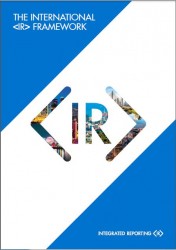The release of the International IR Framework Cover International Integrated Reporting Framework on Monday 9 December 2013, marks an important milestone in the market-led evolution of corporate reporting. It follows a three-month global consultation led by the International Integrated Reporting Council (IIRC) earlier this year, which elicited over 350 responses from every region in the world, the overwhelming majority of which expressed support for.
Integrated Reporting applies principles and concepts that are focused on bringing greater cohesion and efficiency to the reporting process, and adopting “integrated thinking” as a way of breaking down internal silos and reducing duplication. It improves the quality of information available to providers of financial capital to enable a more efficient and productive allocation of capital. Its focus on value creation, and the ‘capitals’ used by the business to create value over time, contributes towards a more financially stable global economy and is a force for sustainability.
The Framework will be used to accelerate the adoption of across the world, where it is currently being trialled in over 25 countries, 16 of which are members of the G20, the group of nations focused on strengthening the global economy.
Commenting on the release of the Framework, IIRC Chairman Professor Mervyn King SC, said, “We have been taken aback by the degree to which mainstream businesses and investors have been willing to participate in creating this Framework and embarking on their own journey. Last month PepsiCo became the latest global company to sign up to the IIRC’s 100-plus strong business network, which includes HSBC, Unilever, Deutsche Bank, China Light & Power, Hyundai Engineering and Construction, National Australia Bank and Tata Steel.
“I am delighted that the day has come when businesses worldwide can use the Framework as a tool for the better articulation of their strategy, and to engage investors on a more long-term journey to attract investment that will be crucial to achieving sustained, and sustainable, prosperity.”
IIRC Chief Executive Officer, Paul Druckman, said, “The Framework brings technical rigour and cohesion to a process that has grown organically and through market pressure over the last three years. Today we have fired the starting gun on a period of global adoption that will begin in early 2014 by showcasing practical examples of reporting innovation, including how businesses are demonstrating value creation using the ‘capitals’ model and principles such as the connectivity of information.
“We could not have reached this milestone without the dedicated support of our innovators, our Pilot Programme participants who have contributed so much to the development of the Framework. Together they have ensured that is relevant to the mainstream business and investor communities, and can be incorporated as part of existing reporting requirements.
“We will use the Framework, together with examples and evidence of the business and investor case, to reach out to a wider pool of businesses who are seeking to adopt for the first time. It is the right time to participate in the journey towards a better, more cohesive reporting landscape that makes sense both to businesses and to the decisions of providers of financial capital, in this interconnected, complex and resource-constrained world.”
HRH The Prince of Wales endorses the new international Integrated Reporting Framework
What is Integrated Reporting ?
Integrated Reporting is a process founded on integrated thinking that results in a periodic integrated report by an organization about value creation over time and related communications regarding aspects of value creation.
An integrated report is a concise communication about how an organization’s strategy, governance, performance and prospects, in the context of its external environment, lead to the creation of value in the short, medium and long term.
How will integrated reporting shape the future of business?
Integrated Reporting is needed by business and investors. Businesses need a reporting environment that is conducive to understanding and articulating their strategy, which helps to drive performance internally and attract financial capital for investment. Investors need to understand how the strategy being pursued creates value over time.
What does an integrated report look like?
Ever wondered how accountants and CFOs might incorporate corporate social and environmental governance information in corporate reports?
Check out the international examples database here.

